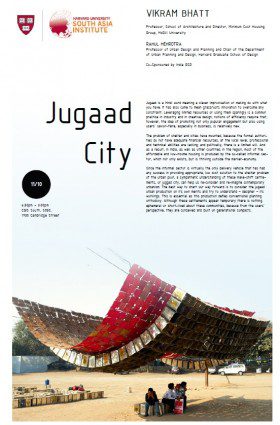Urbanization Seminar
Please note the updated date and location.
Vikram Bhatt, Professor, School of Architecture and Director, Minimum Cost Housing Group, McGill University
Chair: Rahul Mehrotra, Professor of Urban Design and Planning and Chair of the Department of Urban Planning and Design, Harvard Graduate School of Design
Jugaad is a Hindi word meaning a clever improvisation or making do with what you have. It has also come to mean grassroots innovation to overcome any constraint. Leveraging limited resources or using them sparingly is a common practice in industry and in creative design; notions of efficiency require that; however, the idea of promoting not only popular engagement but also using users’ savoir-faire, especially in business, is relatively new.
The problem of shelter and cities have mounted, because the formal authorities do not have adequate financial resources; at the local level, professional and technical abilities are lacking; and politically, there is a limited will. And as a result, in India, as well as other countries in the region, most of the affordable and low-income housing is produced by the so-called informal sector, which not only exists, but is thriving outside the market-economy
Since the informal sector is virtually the only delivery vehicle that has had any success in providing appropriate, low cost solution to the shelter problem of the urban poor, a sympathetic understanding of these make-shift settlements, or juggad city, can help us re-consider and re-imagine contemporary urbanism. The best way to chart our way forward is to consider the jugaad urban production on its own merits and try to understand – decipher – its workings. This is essential as this production defies conventional planning orthodoxy. Although these settlements appear temporary there is nothing ephemeral or short-lived about these communities, because from the users’ perspective, they are conceived and built on generational compacts.
Cosponsored by India GSD
Expert Pushes for Cost-Effective Design in India (The Harvard Crimson)

